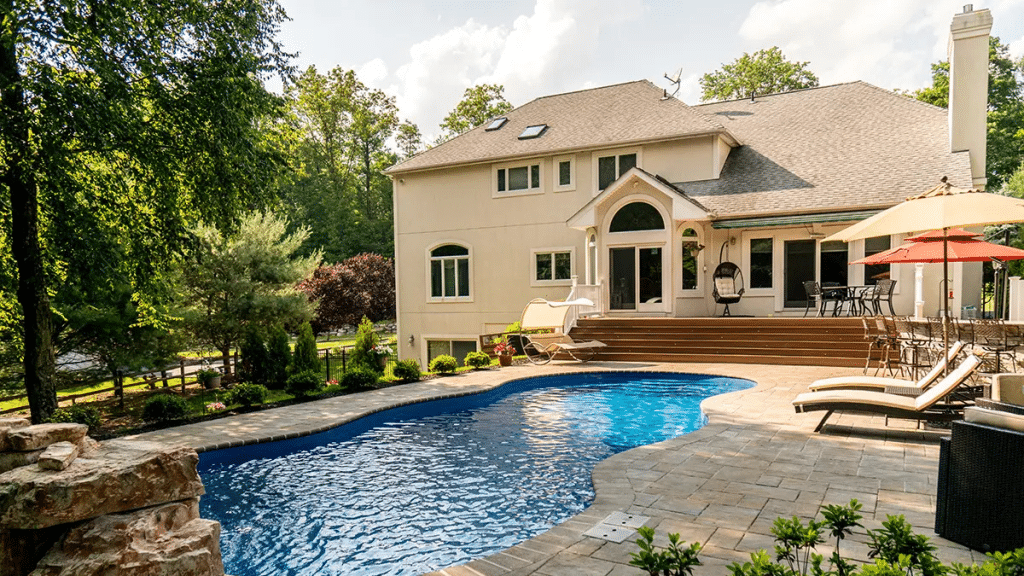Choosing between an above-ground and an in-ground pool involves more than just aesthetics. Each type has distinct benefits and limitations, depending on your budget, yard layout, long-term plans, and personal preferences. Here’s a breakdown to help you decide which option suits your outdoor space best.
When building a pool, you have a wide range of options to choose from—not just in design, features, and materials, but also in how you pay for it. Swimming pool loans offer a flexible way to finance your project, allowing you to spread the cost over several years. This makes it easier to manage your budget, reduce the upfront financial burden, and start enjoying your new pool right away without delay.
Installation and Cost
Above-Ground Pools
Above-ground pools are generally less expensive and quicker to install. Most can be set up within a few days and require minimal site preparation. This makes them ideal for families seeking a more budget-friendly way to enjoy swimming at home.
In-Ground Pools
In-ground pools require significant investment in excavation, materials, and labor. The installation process may take several weeks or even months, depending on complexity. However, they offer a permanent and more luxurious feel that can enhance property value.
Design and Aesthetics
Above-Ground Pools
Design options are limited with above-ground models. Most come in standard shapes like round or oval, and while some decorative enhancements are available, the look tends to be more utilitarian.
In-Ground Pools
In-ground pools offer extensive customization. You can choose from various shapes, depths, finishes, and add-ons like waterfalls, tanning ledges, and integrated spas. This flexibility allows for a pool that integrates seamlessly into landscaping and backyard design.
Durability and Maintenance
Above-Ground Pools
These pools typically have a lifespan of 7–15 years, depending on the quality and maintenance. Their components may wear out faster, especially in harsh climates. Maintenance is relatively straightforward, but the smaller filtration systems may require more frequent attention.
In-Ground Pools
With proper care, in-ground pools can last several decades. They are built with more robust materials like concrete, fiberglass, or vinyl. While maintenance might be more involved, professional servicing is readily available.
Space and Yard Considerations
Above-Ground Pools
Ideal for smaller yards or spaces with uneven terrain, above-ground pools can be installed without significant alterations to your landscape. Some models are portable and can be disassembled if needed.
In-Ground Pools
These pools require ample, level space and may involve removing trees, grading land, or reworking landscaping. They are best suited for homeowners with long-term plans for staying in their property.
Safety and Accessibility
Above-Ground Pools
Their elevated design makes them more difficult for small children or pets to access, which can be a built-in safety feature. However, this also means entry and exit require ladders or steps, which may not be ideal for everyone.
In-Ground Pools
In-ground pools are more accessible and can be customized with shallow ends, steps, and handrails. That said, they require vigilant safety measures like fences, covers, and alarms to prevent accidents.
Resale and Property Value
Above-Ground Pools
These pools generally do not increase property value and may even detract from it if they are not well maintained or appear temporary.
In-Ground Pools
A well-designed in-ground pool can be a selling point, especially in warmer climates where pools are in high demand. They often add to a home’s marketability and perceived luxury.
Which Pool Is Right for You?
Choose an above-ground pool if:
- You’re looking for a lower-cost option.
- You want a quick, temporary setup.
- Your yard is small or sloped.
- You plan to move in the near future.
Opt for an in-ground pool if:
- You want a long-term investment.
- You value customization and aesthetics.
- You have a larger, level yard.
- You’re focused on boosting your home’s value.
Your choice ultimately depends on your lifestyle, budget, and how you envision using your pool for years to come. A clear understanding of the pros and cons will help you make the best decision for your space and your needs.
